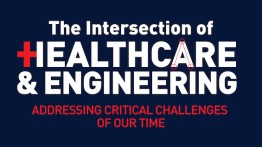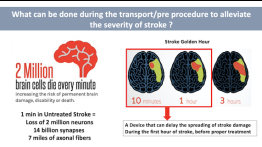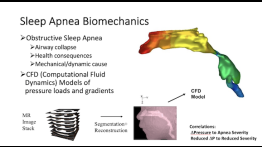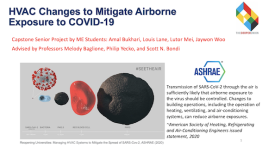Symposium Addresses Intersection of Healthcare and Engineering
POSTED ON: May 17, 2021
In April, a group of engineering faculty and students presented their latest research for a program entitled Intersection of Healthcare and Engineering: Addressing Critical Challenges of Our Time. The symposium, which was moderated by Dean Barry Shoop, highlighted seven projects undertaken by Cooper engineers that focus on biomedical research. The evening’s program precedes the new bioengineering minor that will be available to all Cooper engineering students starting in the Fall 2021 semester.
Almost all of the featured work included collaborations among professors, students, and other institutions, many of which employ Cooper Union graduates. For instance, chemical engineering professor Jennifer Weiser and her student Sanjna Rao, a junior studying chemical engineering, have teamed with the Icahn School of Medicine at Mount Sinai where they work with Tyler DiStefano ME’15 and Christopher Panebianco ChE’16. DiStefano and Panebianco are each earning their doctorates at Icahn in biomedical science under the guidance of Dr. James Iatridis, Professor and Vice Chair for Research in the Leni and Peter W. May Department of Orthopaedics at the Icahn School of Medicine at Mount Sinai. The team’s project aims to create injectable biomaterials to help treat patients with back pain due to degeneration of discs between vertebrae.
Professor Weiser along with master’s students Mahir Alam and Robert Godkin, as well as undergraduates Emily Yasharpour, Iram Rahman, and Ibrahim Abusharkh, are working on another project with their Mount Sinai colleagues. For this project, the Weiser–Iatridis team studied air flow in operating rooms. The team builds computational fluid dynamic models with the ultimate goal of determining optimal arrangement of operating room equipment and best practices in order to reduce the rate of post-surgical infections.
Air flow is also at the heart of the work of another team headed by Professors Melody Baglione, Philip Yecko, and Scott N. Bondi. Building on ongoing research about the use of HVAC systems at Cooper, the team investigates how to mitigate exposure to the COVID-19 virus via HVAC systems. Their students—Amal Bukhari, Louis Lane, Lutor Mei, and Jaywon Woo—presented their research, which is part of their Capstone Senior Project as soon-to-be mechanical engineering graduates. Part of their research has consisted of online seminars about reopening universities after COVID-19, as well as ones with various aerosol experts including José Jimenez from The University of Colorado at Boulder and Martin Bazant from MIT. Once their findings are finalized, says Professor Baglione, “the senior project team will communicate our recommendations to Buildings and Grounds and the Health and Safety Committee.”
Air flow of a different kind informs the work of another group researching sleep apnea. Under the direction of Professor David Wootton, Raphael Kepecs, and Gianna Slusher (both junior mechanical engineering students) collaborate with 2018 graduate Donggyoon Hong and 2021 master's student Jiaqi [Kino] Shen to build computer models for physicians to measure biomechanical characteristics of the respiratory system. Working with pediatricians and medical image processing experts at the University of Pennsylvania and the Montefiore Children’s Hospital/Albert Einstein College of Medicine in New York, they aim to create testing methods that are non-invasive using MRI imagery and commercial or open-source computer-aided engineering tools.
An additional two projects ask how we can use existing technology in new ways. Professor Sam Keene and a team of current and former students—Jonathan Pedoeem EE’20, Shifra Abbitan EE’20, and Guy Bar Yosef EE’20; MEE’21—and graduate students—DongKyu Kim EE’19; MEE’19, Krishna Thiyagarajan ME’18, and Junbum Kim EE’17—are researching ways that healthcare could benefit from advances in machine learning. Professor Eric Lima, who earned his doctorate in cartilage tissue engineering, is mentoring five senior mechanical engineers as they complete their capstone project—Ruben Solano, Jacques Mosseri, Hyomin Seo, Jared Lam, and Brian Dehority. Their work builds on the research of Professor Lima, who designs biomedical devices. He and his students presented their work on a catheter meant to increase collateral blood circulation to people who have suffered an acute ischemic stroke. The device is inserted into the nose to electrically stimulate facial nerves that instigate blood circulation to the brain.
These projects come at a propitious moment for bioengineering at Cooper: in addition to the new engineering minor, last November the school was the recipient of a grant of almost $1.6 million by an anonymous donor. The funds will support bioengineering and biomedical education, research, and projects.








